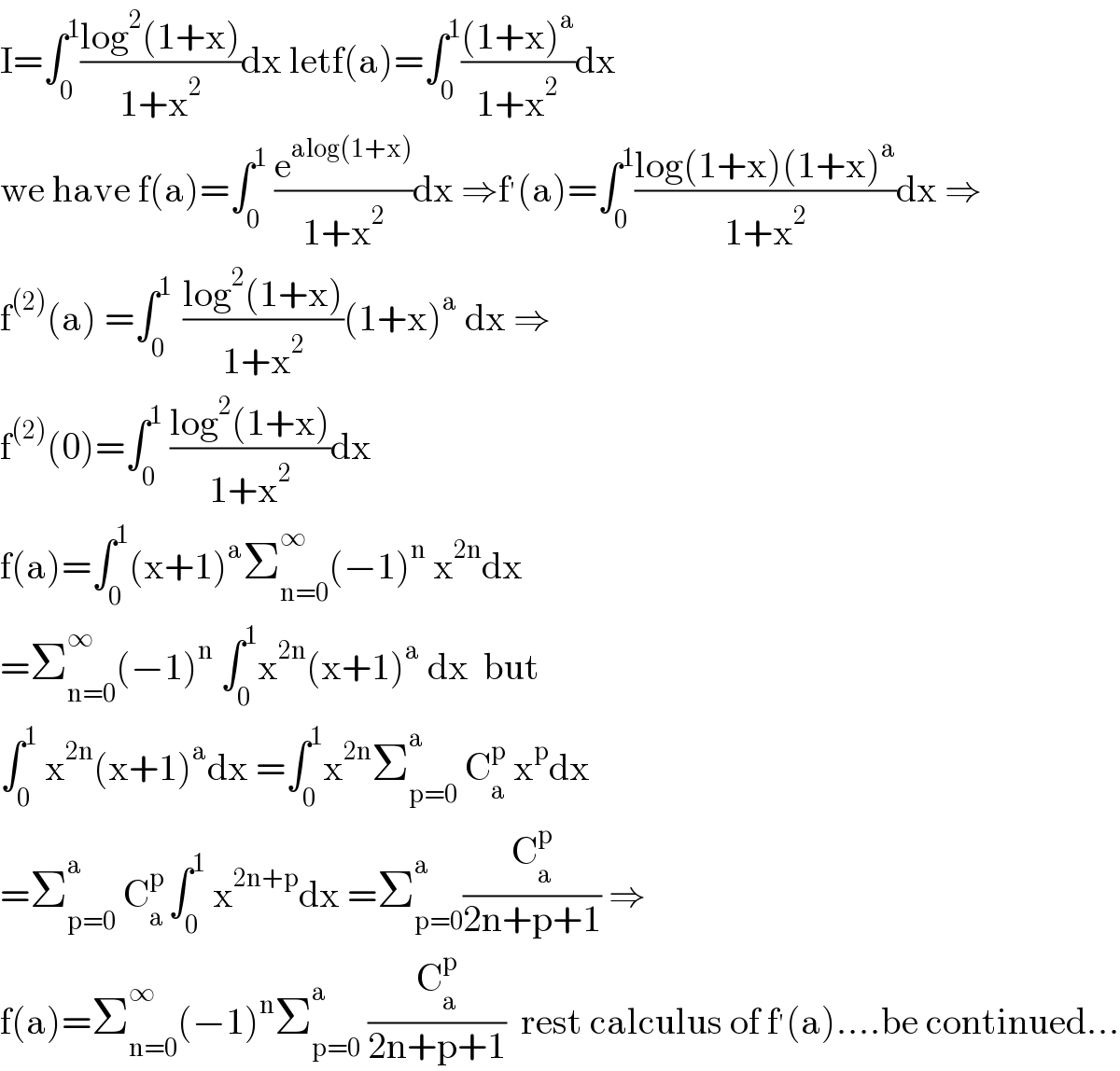Question Number 161443 by smallEinstein last updated on 18/Dec/21

Answered by mathmax by abdo last updated on 18/Dec/21

$$\mathrm{I}=\int_{\mathrm{0}} ^{\mathrm{1}} \frac{\mathrm{log}^{\mathrm{2}} \left(\mathrm{1}+\mathrm{x}\right)}{\mathrm{1}+\mathrm{x}^{\mathrm{2}} }\mathrm{dx}\:\mathrm{letf}\left(\mathrm{a}\right)=\int_{\mathrm{0}} ^{\mathrm{1}} \frac{\left(\mathrm{1}+\mathrm{x}\right)^{\mathrm{a}} }{\mathrm{1}+\mathrm{x}^{\mathrm{2}} }\mathrm{dx}\:\:\:\:\:\: \\ $$$$\mathrm{we}\:\mathrm{have}\:\mathrm{f}\left(\mathrm{a}\right)=\int_{\mathrm{0}} ^{\mathrm{1}} \:\frac{\mathrm{e}^{\mathrm{alog}\left(\mathrm{1}+\mathrm{x}\right)} }{\mathrm{1}+\mathrm{x}^{\mathrm{2}} }\mathrm{dx}\:\Rightarrow\mathrm{f}^{'} \left(\mathrm{a}\right)=\int_{\mathrm{0}} ^{\mathrm{1}} \frac{\mathrm{log}\left(\mathrm{1}+\mathrm{x}\right)\left(\mathrm{1}+\mathrm{x}\right)^{\mathrm{a}} }{\mathrm{1}+\mathrm{x}^{\mathrm{2}} }\mathrm{dx}\:\Rightarrow \\ $$$$\mathrm{f}^{\left(\mathrm{2}\right)} \left(\mathrm{a}\right)\:=\int_{\mathrm{0}} ^{\mathrm{1}\:} \:\frac{\mathrm{log}^{\mathrm{2}} \left(\mathrm{1}+\mathrm{x}\right)}{\mathrm{1}+\mathrm{x}^{\mathrm{2}} }\left(\mathrm{1}+\mathrm{x}\right)^{\mathrm{a}} \:\mathrm{dx}\:\Rightarrow \\ $$$$\mathrm{f}^{\left(\mathrm{2}\right)} \left(\mathrm{0}\right)=\int_{\mathrm{0}} ^{\mathrm{1}} \:\frac{\mathrm{log}^{\mathrm{2}} \left(\mathrm{1}+\mathrm{x}\right)}{\mathrm{1}+\mathrm{x}^{\mathrm{2}} }\mathrm{dx} \\ $$$$\mathrm{f}\left(\mathrm{a}\right)=\int_{\mathrm{0}} ^{\mathrm{1}} \left(\mathrm{x}+\mathrm{1}\right)^{\mathrm{a}} \sum_{\mathrm{n}=\mathrm{0}} ^{\infty} \left(−\mathrm{1}\right)^{\mathrm{n}} \:\mathrm{x}^{\mathrm{2n}} \mathrm{dx} \\ $$$$=\sum_{\mathrm{n}=\mathrm{0}} ^{\infty} \left(−\mathrm{1}\right)^{\mathrm{n}} \:\int_{\mathrm{0}} ^{\mathrm{1}} \mathrm{x}^{\mathrm{2n}} \left(\mathrm{x}+\mathrm{1}\right)^{\mathrm{a}} \:\mathrm{dx}\:\:\mathrm{but} \\ $$$$\int_{\mathrm{0}} ^{\mathrm{1}} \:\mathrm{x}^{\mathrm{2n}} \left(\mathrm{x}+\mathrm{1}\right)^{\mathrm{a}} \mathrm{dx}\:=\int_{\mathrm{0}} ^{\mathrm{1}} \mathrm{x}^{\mathrm{2n}} \sum_{\mathrm{p}=\mathrm{0}} ^{\mathrm{a}\:} \:\mathrm{C}_{\mathrm{a}} ^{\mathrm{p}} \:\mathrm{x}^{\mathrm{p}} \mathrm{dx} \\ $$$$=\sum_{\mathrm{p}=\mathrm{0}} ^{\mathrm{a}} \:\mathrm{C}_{\mathrm{a}} ^{\mathrm{p}\:} \int_{\mathrm{0}} ^{\mathrm{1}} \:\mathrm{x}^{\mathrm{2n}+\mathrm{p}} \mathrm{dx}\:=\sum_{\mathrm{p}=\mathrm{0}} ^{\mathrm{a}} \frac{\mathrm{C}_{\mathrm{a}} ^{\mathrm{p}} }{\mathrm{2n}+\mathrm{p}+\mathrm{1}}\:\Rightarrow \\ $$$$\mathrm{f}\left(\mathrm{a}\right)=\sum_{\mathrm{n}=\mathrm{0}} ^{\infty} \left(−\mathrm{1}\right)^{\mathrm{n}} \sum_{\mathrm{p}=\mathrm{0}} ^{\mathrm{a}} \:\frac{\mathrm{C}_{\mathrm{a}} ^{\mathrm{p}} }{\mathrm{2n}+\mathrm{p}+\mathrm{1}}\:\:\mathrm{rest}\:\mathrm{calculus}\:\mathrm{of}\:\mathrm{f}^{'} \left(\mathrm{a}\right)….\mathrm{be}\:\mathrm{continued}… \\ $$
